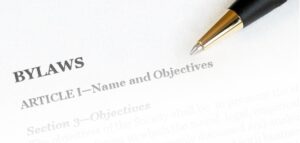by Diocesan Chancellor Andy Roman

The answer to this question is, probably no, you should not need to amend the parish bylaws. Most if not all of the parishes of the Diocese are organized as nonprofit corporations under Pennsylvania law. Pennsylvania has adopted statutes that govern many aspects of forming and operating a nonprofit corporation. Those statutes allow the nonprofit corporation to hold the annual meeting of its members and the meetings of its board of directors (i.e., its Vestry) using remote technology – unless the bylaws expressly prohibit remote attendance or participation at the meetings.
The statutes are broad enough to allow the Annual Meeting of the parish to be conducted either as a fully remote meeting, where essentially everyone attending is doing so through the use of technology (like the 155th Diocesan Convention), or as a partially remote meeting, where some members attend in person, and some attend remotely. The statutes are found in the Pennsylvania Associations Code, which is Title 15 of the Pennsylvania Consolidated Statutes.
Fully Remote Meetings
Section 5704 of the Associations Code deals with the “Place and notice of meetings of members” and contains this helpful provision in subsection (a) dealing with the “Place” for a meeting of members, authorizing a fully remote meeting:
“If a meeting of members is held by means of the Internet or other electronic communications technology in a fashion pursuant to which members have the opportunity to read or hear the proceedings substantially concurrently with their occurrence, vote on matters submitted to the members, pose questions to the directors and members of any other body, make appropriate motions and comment on the business of the meeting, the meeting need not be held at a particular geographic location.”
Under Section 5709(b), the presiding officer of the corporation “shall have authority to establish rules for the conduct of the meeting” of the members, unless the bylaws provide otherwise. This would grant the presiding officer, typically the Rector or Priest-in-Charge, with the authority to call the fully remote meeting permitted by Section 5704(a), unless the bylaws provided otherwise.
Care should be taken to include the plans to conduct the meeting remotely in the notice of the meeting, so that all members know sufficiently in advance what they need to do in order to attend the meeting and participate in its business.
Partially Remote Meeting
The option of a partially remote meeting also exists, where some members of the parish attend in person and some attend remotely. Section 5708(b) provides that:
“Except as otherwise provided in the bylaws, the presence or participation, including voting and taking other action, at a meeting of members, or the expression of consent or dissent to corporate action, by a member by conference telephone or other electronic means, including, without limitation, the Internet, shall constitute the presence of, or vote or action by, or consent or dissent of the member for the purposes of this subpart.”
So unless the parish bylaws anticipate this issue and preclude the use of technology to attend the Annual Meeting, the statutes permit remote attendance using technology and deem that to “constitute the presence of” the member for purposes of the Annual Meeting.
What about use of a written proxy?
The Associations Code only permits the use of a written proxy for voting by a member if a provision in the bylaws explicitly permits vote by written proxy. See Section 5759. That is not the norm in the Diocese, so it is unlikely that such a provision is contained in any parish bylaws.
What happens if the Annual Meeting is not held during the time specified in the Bylaws?
Nothing of any legal adversity happens if the Annual Meeting is not held during the time period specified in the bylaws. Section 5755 of the Associations Code deals with this issue and provides in relevant part:
“Failure to hold the annual or other regular meeting at the designated time shall not work a dissolution of the corporation or affect otherwise valid corporate acts. If the annual or other regular meeting is not called and held within six months after the designated time, any member may call the meeting at any time thereafter.”
The members of the Vestry whose terms would ordinarily expire at the time their successors are elected would continue in office until the Annual Meeting is rescheduled and the election can take place, pursuant to Section 5725(c)(3).
What About Vestry Meetings?
Similar provisions allow the Vestry to meet remotely using conference telephone or other electronic technology, unless the bylaws provide otherwise. See Section 5708(a) of the Associations Code. In addition, the statutes allow Vestries to take an “Action by consent.” Section 5727(b) provides:
“Unless otherwise restricted in the bylaws, any action required or permitted to be approved at a meeting of the directors may be approved without a meeting if a consent or consents to the action in record form are signed, before, on or after the effective date of the action by all of the directors in office on the date the last consent is signed. The consent or consents must be filed with the secretary of the corporation.”
These consents can be given and stored via email.
So, unless your parish is not organized as a nonprofit corporation, or has a bylaw provision restricting the use of technology to conduct meetings or give required consents, conducting business “virtually” is already possible, as explained above, without adding to or changing the existing parish bylaws.
